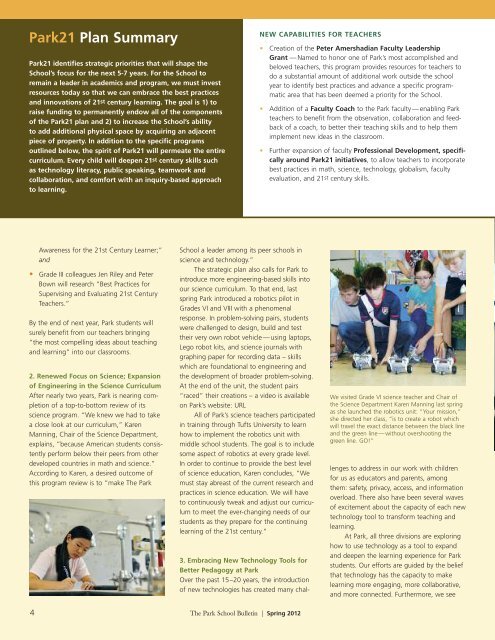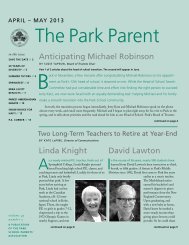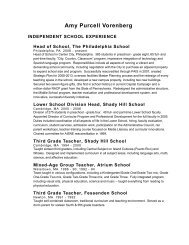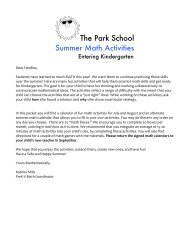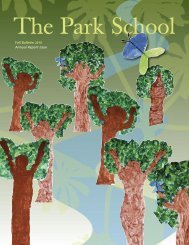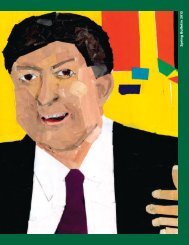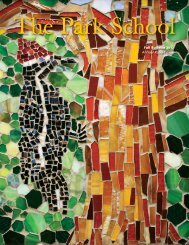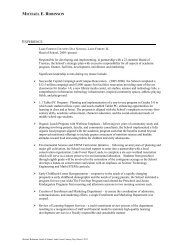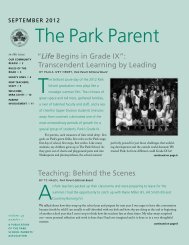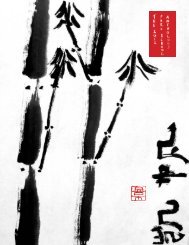Spring Bulletin 2012 - The Park School
Spring Bulletin 2012 - The Park School
Spring Bulletin 2012 - The Park School
Create successful ePaper yourself
Turn your PDF publications into a flip-book with our unique Google optimized e-Paper software.
<strong>Park</strong>21 Plan Summary<br />
<strong>Park</strong>21 identifies strategic priorities that will shape the<br />
<strong>School</strong>’s focus for the next 5-7 years. For the <strong>School</strong> to<br />
remain a leader in academics and program, we must invest<br />
resources today so that we can embrace the best practices<br />
and innovations of 21st century learning. <strong>The</strong> goal is 1) to<br />
raise funding to permanently endow all of the components<br />
of the <strong>Park</strong>21 plan and 2) to increase the <strong>School</strong>’s ability<br />
to add additional physical space by acquiring an adjacent<br />
piece of property. In addition to the specific programs<br />
outlined below, the spirit of <strong>Park</strong>21 will permeate the entire<br />
curriculum. Every child will deepen 21st century skills such<br />
as technology literacy, public speaking, teamwork and<br />
collaboration, and comfort with an inquiry-based approach<br />
to learning.<br />
Awareness for the 21st Century Learner;”<br />
and<br />
• Grade III colleagues Jen Riley and Peter<br />
Bown will research “Best Practices for<br />
Supervising and Evaluating 21st Century<br />
Teachers.”<br />
By the end of next year, <strong>Park</strong> students will<br />
surely benefit from our teachers bringing<br />
“the most compelling ideas about teaching<br />
and learning” into our classrooms.<br />
2. Renewed Focus on Science; Expansion<br />
of Engineering in the Science Curriculum<br />
After nearly two years, <strong>Park</strong> is nearing completion<br />
of a top-to-bottom review of its<br />
science program. “We knew we had to take<br />
a close look at our curriculum,” Karen<br />
Manning, Chair of the Science Department,<br />
explains, “because American students consistently<br />
perform below their peers from other<br />
developed countries in math and science.”<br />
According to Karen, a desired outcome of<br />
this program review is to “make <strong>The</strong> <strong>Park</strong><br />
<strong>School</strong> a leader among its peer schools in<br />
science and technology.”<br />
<strong>The</strong> strategic plan also calls for <strong>Park</strong> to<br />
introduce more engineering-based skills into<br />
our science curriculum. To that end, last<br />
spring <strong>Park</strong> introduced a robotics pilot in<br />
Grades VI and VIII with a phenomenal<br />
response. In problem-solving pairs, students<br />
were challenged to design, build and test<br />
their very own robot vehicle — using laptops,<br />
Lego robot kits, and science journals with<br />
graphing paper for recording data – skills<br />
which are foundational to engineering and<br />
the development of broader problem-solving.<br />
At the end of the unit, the student pairs<br />
“raced” their creations – a video is available<br />
on <strong>Park</strong>’s website: URL<br />
All of <strong>Park</strong>’s science teachers participated<br />
in training through Tufts University to learn<br />
how to implement the robotics unit with<br />
middle school students. <strong>The</strong> goal is to include<br />
some aspect of robotics at every grade level.<br />
In order to continue to provide the best level<br />
of science education, Karen concludes, “We<br />
must stay abreast of the current research and<br />
practices in science education. We will have<br />
to continuously tweak and adjust our curriculum<br />
to meet the ever-changing needs of our<br />
students as they prepare for the continuing<br />
learning of the 21st century.”<br />
3. Embracing New Technology Tools for<br />
Better Pedagogy at <strong>Park</strong><br />
Over the past 15–20 years, the introduction<br />
of new technologies has created many chal-<br />
4 <strong>The</strong> <strong>Park</strong> <strong>School</strong> <strong>Bulletin</strong> | <strong>Spring</strong> <strong>2012</strong><br />
NEW CAPABILITIES FOR TEACHERS<br />
• Creation of the Peter Amershadian Faculty Leadership<br />
Grant — Named to honor one of <strong>Park</strong>’s most accomplished and<br />
beloved teachers, this program provides resources for teachers to<br />
do a substantial amount of additional work outside the school<br />
year to identify best practices and advance a specific programmatic<br />
area that has been deemed a priority for the <strong>School</strong>.<br />
• Addition of a Faculty Coach to the <strong>Park</strong> faculty — enabling <strong>Park</strong><br />
teachers to benefit from the observation, collaboration and feedback<br />
of a coach, to better their teaching skills and to help them<br />
implement new ideas in the classroom.<br />
• Further expansion of faculty Professional Development, specifically<br />
around <strong>Park</strong>21 initiatives, to allow teachers to incorporate<br />
best practices in math, science, technology, globalism, faculty<br />
evaluation, and 21st century skills.<br />
We visited Grade VI science teacher and Chair of<br />
the Science Department Karen Manning last spring<br />
as she launched the robotics unit: “Your mission,”<br />
she directed her class, “is to create a robot which<br />
will travel the exact distance between the black line<br />
and the green line — without overshooting the<br />
green line. GO!”<br />
lenges to address in our work with children<br />
for us as educators and parents, among<br />
them: safety, privacy, access, and information<br />
overload. <strong>The</strong>re also have been several waves<br />
of excitement about the capacity of each new<br />
technology tool to transform teaching and<br />
learning.<br />
At <strong>Park</strong>, all three divisions are exploring<br />
how to use technology as a tool to expand<br />
and deepen the learning experience for <strong>Park</strong><br />
students. Our efforts are guided by the belief<br />
that technology has the capacity to make<br />
learning more engaging, more collaborative,<br />
and more connected. Furthermore, we see


